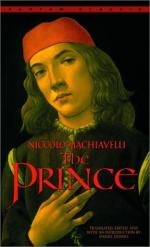
|
| Name: _________________________ | Period: ___________________ |
This test consists of 15 multiple choice questions and 5 short answer questions.
Multiple Choice Questions
1. What was the motivation for Machiavelli to write THE PRINCE?
(a) He wanted to start a revolution.
(b) He wanted to become a prince.
(c) He wanted Prince Lorenzo de Medici to employ him.
(d) He wanted to become a famous author.
2. What is the irony of the death of Oliverotto of Fermo who came to power by assembling all the leaders for a dinner and then killing them all?
(a) He died of natural causes before he could become Prince of Fermo.
(b) A son of one of the murdered men put poison in his wine.
(c) Cesare Borgia did the same thing to him.
(d) He was accidentally killed by a poorly aimed arrow.
3. Does Machiavelli suggest that rising to power through cruelty is always wrong?
(a) He says any use of cruelty cannot be justified.
(b) He states that political assassination is not cruelty.
(c) He believes that cruelty must continue to be successful.
(d) He suggests that there is a proper use of cruelty.
4. In THE PRINCE, why does Machiavelli deal only with dominions and not republics?
(a) Dominions are much larger than republics.
(b) He wrote about republics in another work.
(c) There were no republics in his day.
(d) He thought dominions were much harder to keep.
5. How does Machiavelli think New Dominions were formed?
(a) Through democratic elections.
(b) Through Ability or Accident.
(c) Through Fortune or Ability.
(d) Through War and Pestilence.
6. What is it that Machiavelli refrains from doing in his book?
(a) Using language of respect that is usually spoken before a prince.
(b) Making everything brief in his writing so that main points are missed.
(c) Using high sounding literary devices to make the work seem more important.
(d) Giving only the facts of great leaders and how they governed.
7. What does Machiavelli suggest is the surest way to govern a conquered territory?
(a) Start paying higher salaries to bureaucrats.
(b) Declare many holidays.
(c) Destroy its civil and political systems first.
(d) Keep the old system in place.
8. Machiavelli says some new princes may gain their new states either in exchange for money or as a favor. What other means does he point out for gaining a state?
(a) Making themselves popular with the people.
(b) Bribing the military.
(c) Promising to lower taxes.
(d) Holding many public meetings.
9. Ending his discussion of Ecclesiastical Dominions, why is Machiavelli so circumspect about the current Pope?
(a) Pope Leo does not support the Medici.
(b) Pope Leo is the uncle of Lorenzo de Medici.
(c) Pope Leo might give Machiavelli a job.
(d) Pope Leo fears Niccolo Machiavelli.
10. What reasons does Machiavelli put forward to get Prince Lorenzo to read his book?
(a) Experience and his low-born status.
(b) Experience and his personal need.
(c) Experience and the absence of flattery.
(d) Experience and his ability as a writer.
11. What is Machiavelli offering the Prince Lorenzo de Medici?
(a) The chance to become king of all Italy.
(b) A large book of rules for new princes to use in governing the people.
(c) Personal introductions to great men Machiavelli knows.
(d) Means of mastering in a short time all Machiavelli has learned about governing.
12. Machiavelli gives the example of how Cesare Borgia used Minister Remiro d'Orco in his plan to rule Romagna. After d'Orco brought the territory under control, what does Machiavelli say Cesare Borgia did to get the loyalty of the people?
(a) He executed d'Orco to make the people love and trust him.
(b) He retired d'Orco and gave him a lifetime pension.
(c) He told the people that d'Orco was acting on his orders.
(d) He gave d'Orco the power to kill anyone who opposed him.
13. What characteristic of a leader can change fortune according to Machiavelli?
(a) The intervention of God.
(b) The will of the people.
(c) Being at the right place and in the right time.
(d) A person's innate ability.
14. Before Pope Alexander VI, what prevented the Church from gaining even more power?
(a) The commercial power of the Venetians.
(b) Wars fought between the Colonna, the Orsini and the Pope.
(c) The threat of invasion by France.
(d) The separation of Church and State.
15. Citing Moses, Cyrus, Romulus, and Theseus, what distinction does Machiavelli make about Moses?
(a) Instead of ruling the Egyptians after defeating them, he left.
(b) There is no histroy of Moses outside of the Jewish holy writings.
(c) There was something in Moses, some ability that made him worthy to speak with God.
(d) Moses never actually established himself as a leader.
Short Answer Questions
1. What does Machiavelli see as an inevitable result of changes in government?
2. Why does Machiavelli not discuss democracies?
3. What combination of circumstances does Machiavelli identify in men like Cyrus, Romulus, and Theseus?
4. What form of government comes from a long line of ancestors?
5. How does Machiavelli say that those who help a prince obtain a new princedom may turn against him?
|
This section contains 880 words (approx. 3 pages at 300 words per page) |

|




